Books
Books
published in 2021

From Work to Frame, or, Is There Life After "The Death of the Author"?
"From Work to Frame" was first published in English and Swedish in 1987 in a catalog of the Moderna Museet in Stockholm for the exhibition "Implosion: A Postmodern Perspective" (October 24, 1987 to January 10, 1988).
As S*I*G #12, the text is published in English and in its first German translation, alongside a preface by Hannes Loichinger, who is editor of this issue.
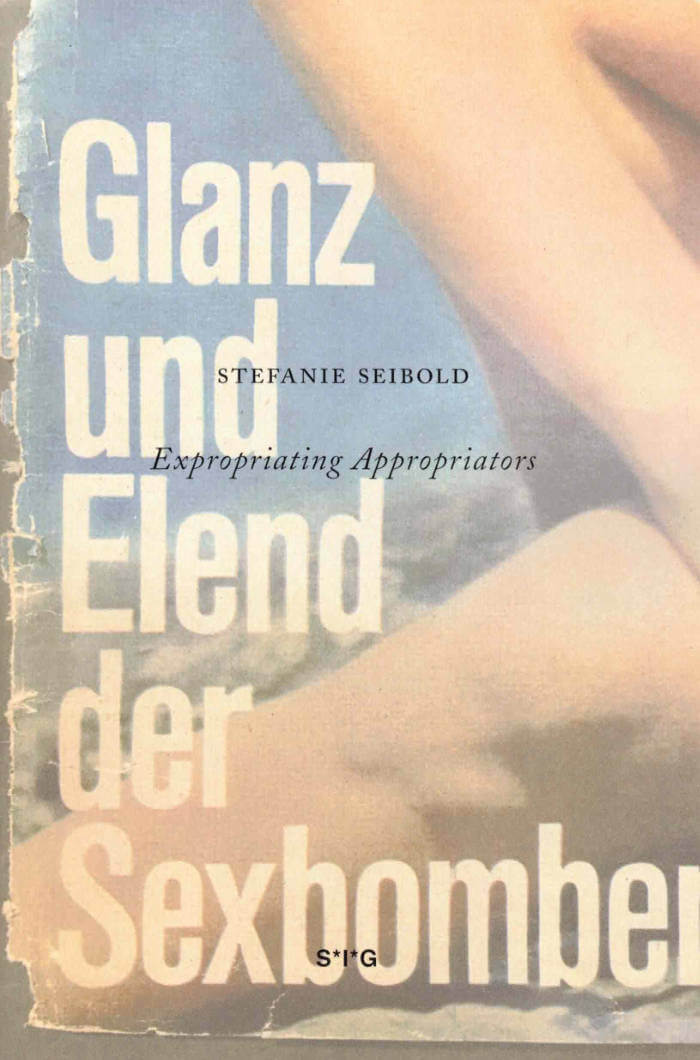
Expropriating Appropriators
An excerpt of images collected over 20 years from popular fashion magazines offers expression to the artist's queer and feminist desires.
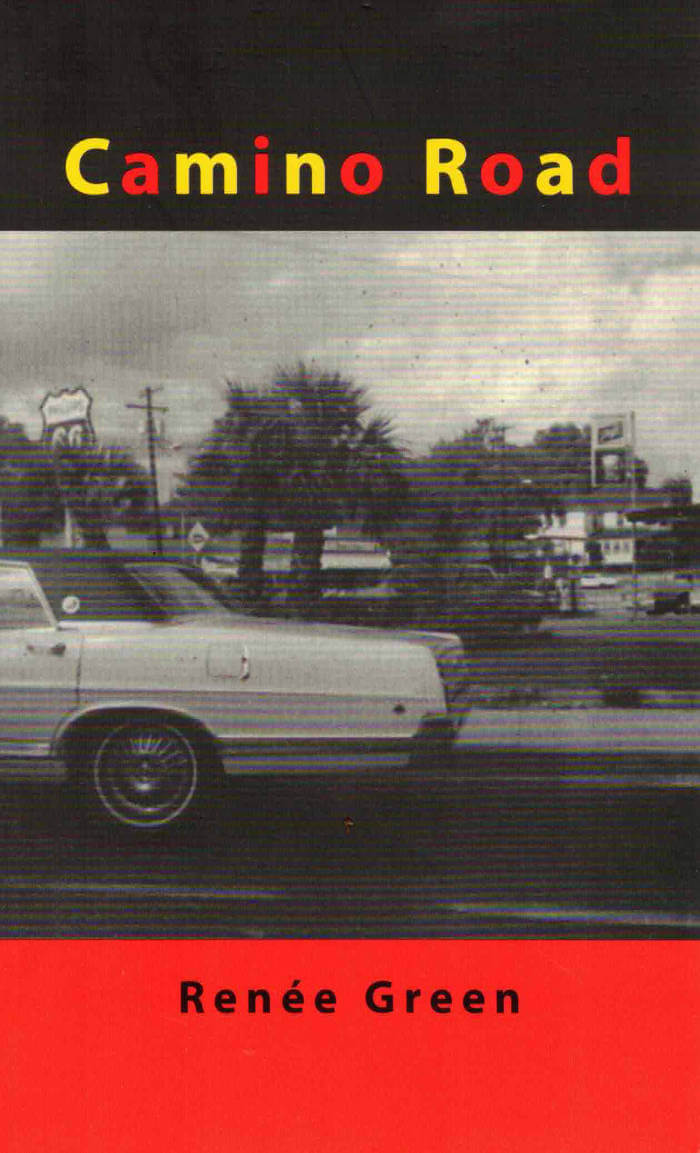
Camino Road
First published in 1994, Camino Road is artist Renée Green’s debut novel—a short, ruminative work infused with semantic ambiguity and the dreamy poetry of the quotidian. Republished here in a facsimile edition, the book ostensibly traces its protagonist Lyn’s journeys to Mexico and her return to attend art school in 1980s New York, but what emerges is more an intertextual assemblage of the moments between drives, dreams, and consciousness. Lyn does her Spanish homework and makes note to read Anna Kavan and Cortázar; she watches Fellini; she dreams about the Mediterranean Sea. Much like Green’s multimedia installations encompassing the sonic, spatial, and visual, Camino Road is richly layered—part intellectual genealogy, part fictional personal memory, and part cultural criticism.
Green has described the book as a “self-conscious homage to or parody of the ‘road novel,’ ‘bohemia,’ and artist-rebels.” “I’d been thinking about the beat generation, figures like Jack Kerouac, Burroughs, etc.—the mythic construction of the artist personality as rebel and how females, and myself in particular, entered into that,” she said. “These ‘beat’ sources seemed to form a typical American introduction to the idea of bohemia and of being an artist.”
Originally created as part of Green’s contribution for the group exhibition Cocido y crudo/The Cooked and the Raw at the Museo Nacional Centro de Arte Reina Sofía, Madrid, the text is written in both English and Spanish, and accompanied by an appendix of photographs and ephemera tracing Madrid’s La Movida, a Spanish countercultural moment from the 1980s. The book was published through Green’s production company, Free Agent Media (FAM), which since 1994 has been circulating and exhibiting media, printed matter, and time-based projects.
A unique treatise on the circuits of exchange in gender, politics, and art, Camino Road can also be read as a variation on the classic Bildungsroman genre. “I don’t feel developed in any area,” thinks Lyn at one point. “It’s very difficult being young and incomplete.” Importantly, she also muses, “I want to be swallowed by another language.”
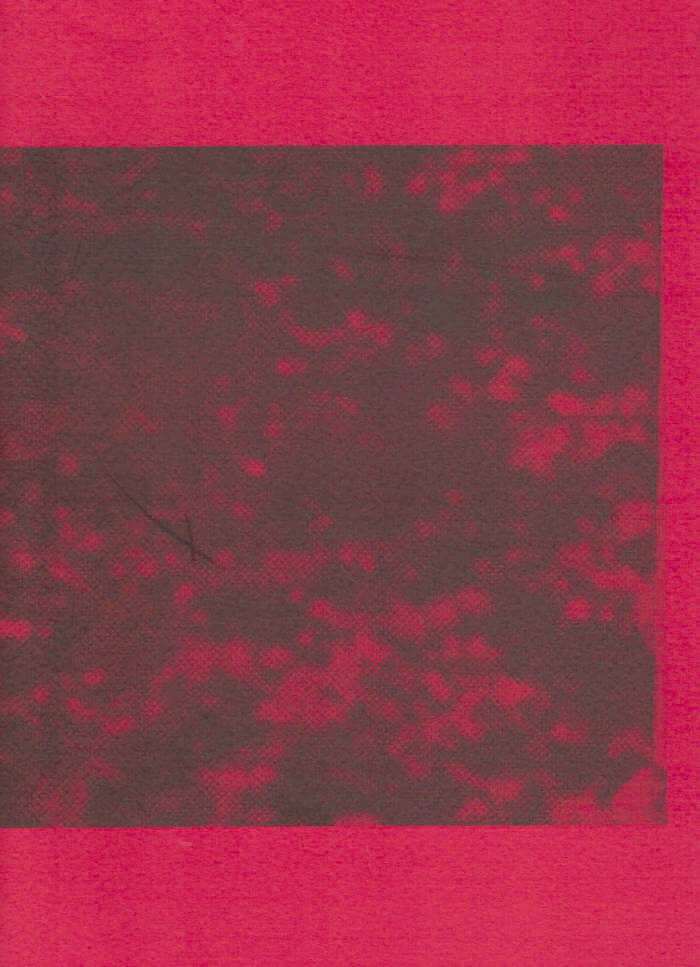
Prison, Poetry, Martyrdom
Saïda Menebhi, the Moroccan Years of Lead
A selection of poems by the Moroccan Marxist, feminist and poet Saida Menebhi, who died in prison on hunger strike in 1977, aged 25, after being imprisoned for her political organising against the Moroccan state. Translated from French to English for the first time, the zine contains a selection of the poems Saida wrote during her time in prison, shortly before her death. It also includes an essay on the Years of Lead in Morocco - specifically the 70s - as well as the conditions of prison, hunger strikes, poetry, and martyrdom (from an internationalist position: including Bobby Sands and the republican hunger strikes).
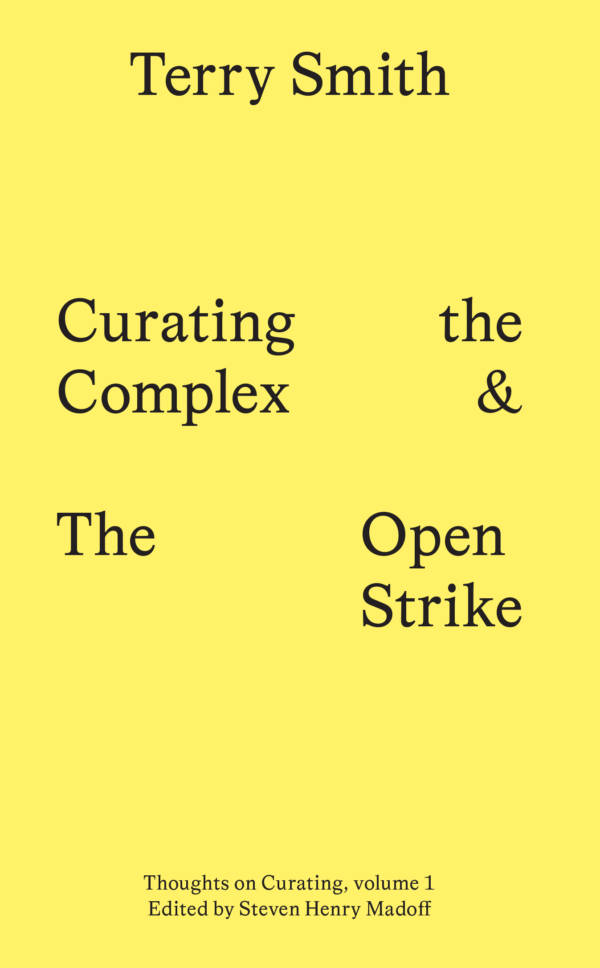
Curating the Complex & The Open Strike
A visionary analysis of what Terry Smith identifies as the "visual arts exhibitionary complex."
In this book, the renowned art historian and writer maps the institutional and quasi-institutional framework for contemporary art that sprawls across the globe. He then delves into a powerful form of curatorial activism rising up in the exhibitionary complex: Open Strike. This is the inaugural volume of the series Thoughts on Curating, edited by Steven Henry Madoff.
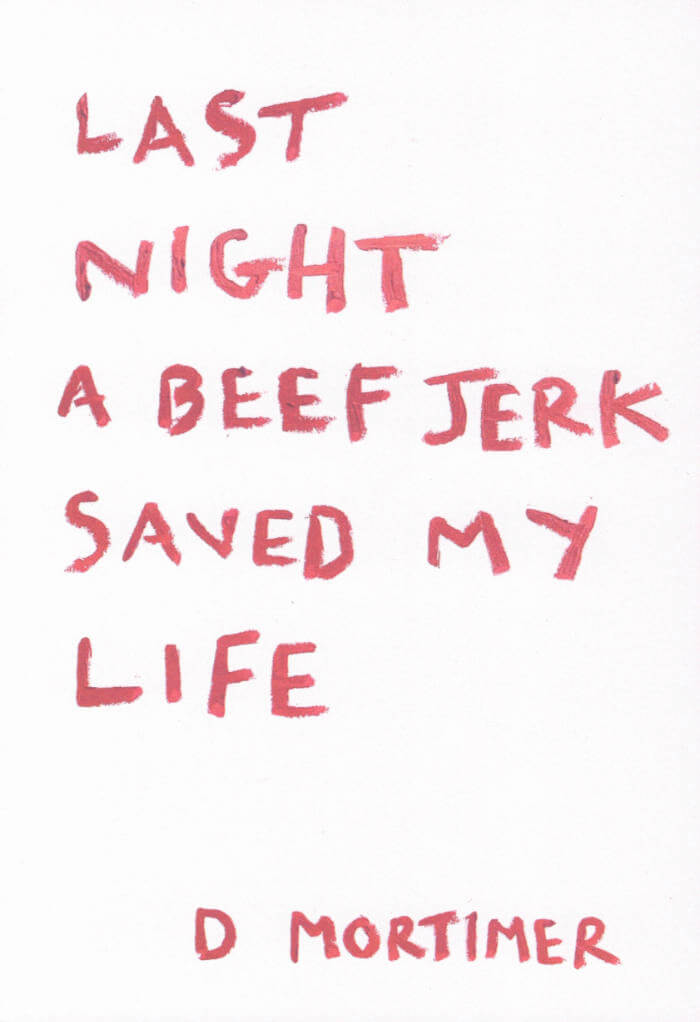
Last Night A Beef Jerk Saved My Life
'Mortimer is one of the most talented writers of our generation and their debut collection proves this. Part essay, part poem, part memoir and part SOS, Last Night a Beef Jerk Saved My Life navigates its thematic scope—ranging from transness, queerness and naming to loving and losing—with sensitivity, insight, humour and bravado. Best thing I read this year.' - Isabel Waidner
'Last Night a Beef Jerk Saved My Life is a wonderful and thoughtful reflection on love and beauty and bodies and music and memories, and on the constellations of small things that make up modern queer life.' - Huw Lemmey
D Mortimer is a writer from London focussed on trans crip narratives. Their work (essays, poetry, prose, creative-criticism) has appeared in Granta and been performed at the Institute of Contemporary Art in London (Queers Read This, The Kathy Acker Reading Group). Their short story ‘Supermarket Revelations’ was published in Liberating the Canon: An Anthology of Innovative Fiction (ed. Waidner, Dostoyevsky Wannabe: 2018) and a poem-essay, 'How To Draw Hands', was published by Warm Yourself by My Trash Fire in 2020.
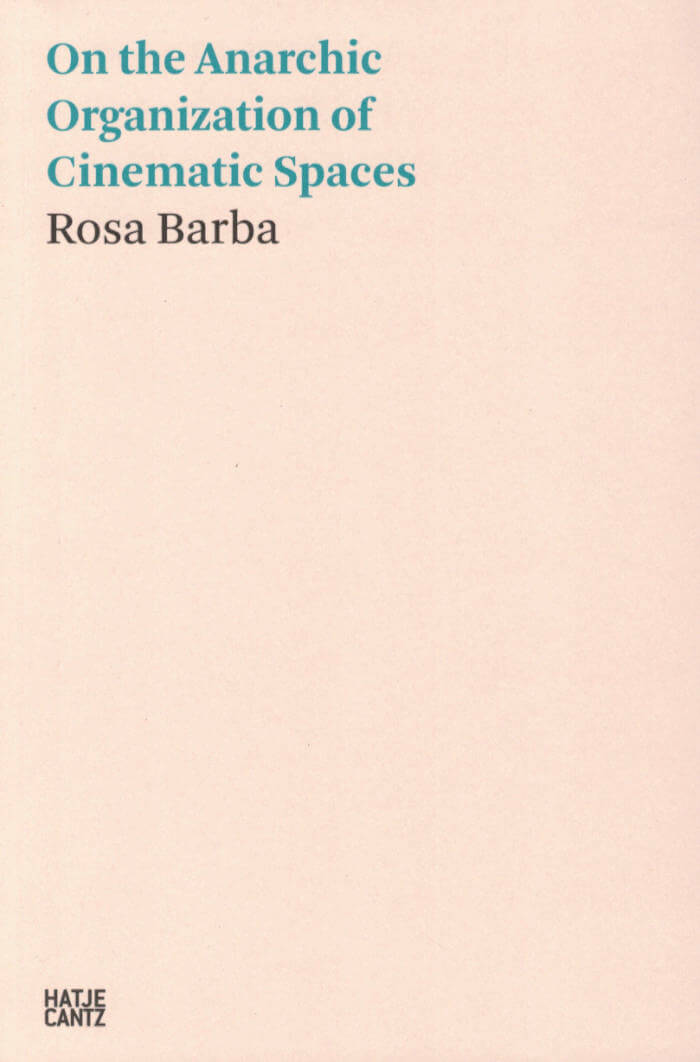
On the Anarchic Organization of Cinematic Spaces – Evoking Spaces beyond Cinema
Employing the concept of an anarchic organization of cinematic spaces, the author embarks in this volume on a journey toward an imaginary political trope for the cinema of the present – a working principle that aims to form a new way of thinking by destabilizing outdated structures of cinema.
ROSA BARBA (*1972, Agrigento, Italy) is an acclaimed artist who works with film. She is the recipient of numerous awards, including the renowned Calder Prize. Her work has been exhibited at the Museo Nacional Centro de Arte Reina Sofía, Madrid, the Schirn Kunsthalle, Frankfurt, and the MIT List Visual Arts Center, Cambridge, MA, among others.

The Error is Regretted
‘Corrections and Clarifications’ is an ongoing newsprint project by Anita Di Bianco, an edited compilation of daily revisions, retractions, re-wordings, distinctions, and apologies to print news from September 2001 to the present. In essence, a reverse chronological catalogue of lapses in naming and classification, tangled catchphrases, and patterns of misspeak and inflection.
Previous editions have examined the printed news media in the United States and United Kingdom, Germany, Austria and Switzerland, and other international press from Asia, Turkey, and the Balkans printed in English. The publication includes text contributions by Di Bianco and Francesco Gagliardi.
108 p, ills bw, 24 x 32 cm, hb, German/English
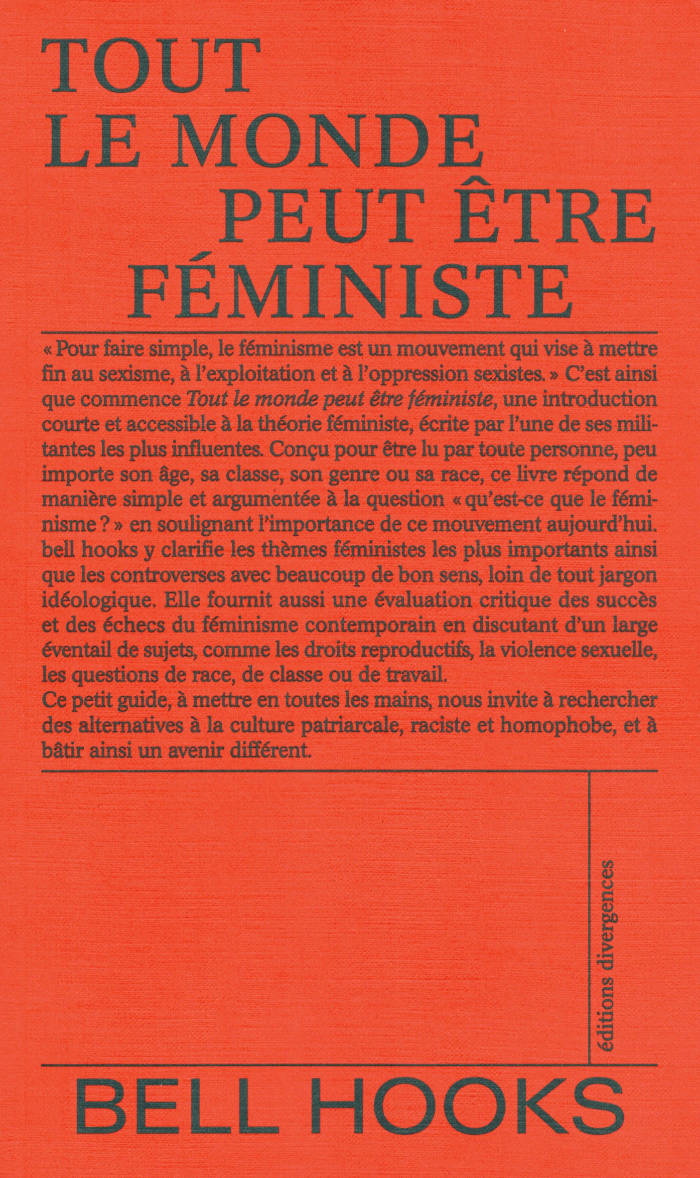
Tout Le Monde Peut Être Féministe
« Pour faire simple, le féminisme est un mouvement qui vise à mettre fin au sexisme, à l’exploitation et à l’oppression sexistes. » Ainsi débute cette efficace et accessible introduction à la théorie féministe, écrite par l’une de ses figures les plus influentes, la militante noire-américaine bell hooks.
Conçu pour pouvoir être lu par tout le monde, ce livre répond de manière simple et argumentée à la question « qu’est-ce que le féminisme ? », en soulignant l’importance du mouvement féministe aujourd’hui. Ce petit guide, à mettre entre toutes les mains, nous invite à rechercher des alternatives à la culture patriarcale, raciste et homophobe, et à bâtir ainsi un avenir différent.
Traduit de l'anglais par Alex Taillard

BRICKS FROM THE KILN #5
Andrew Walsh‐Lister, Matthew Stuart
Bricks from the Kiln is a semi-yearly journal and multifarious publishing platform established in mid-2015 to support critically minded and explorative writing on and around art, design and literature. Edited by Matthew Stuart and Andrew Walsh-Lister, the forthcoming issue, number five, begins with a single sentence:
blankets topologies in glistening snow and blood — produces instructional spattering, again and again — coughs up clotted network diagram hairballs of illegibility — parasitically draws on / from Thomas Browne’s quincunx — meets for The Big ROAR tomorrow, yesterday — lifts loud cows off the page, aloud — flips the coin of language, heads or tails? — politely speaks on writing heard yet seen — twists tongues, transliterates and teases — makes contact with ancestral spirits — traverses the foothills of La Marquesa, past and present — is the Spectre at the feast — (re)traces polymorphous concrete poems — dashes, gestures, speaks, breathes, moves, joyness — is, as ever, tentative, incomplete and inconsistent.
Contributions by Helen Marten, Rebecca May Johnson, Johanna Drucker, Louis Lüthi, Daisy Lafarge, Holly Pester, Ursula K. Le Guin, Quinn Latimer, Stefan Themerson, Slavs and Tatars, Ashanti Harris, Catalina Barroso-Luque, Kevin Lotery, Bronac Ferran with Greg Thomas and Astrid Seme with Alex Balgiu.

Black Revelry: In Honor of ‘The Sugar Shack’
An experiment in book making, which takes up the form of the LP record as a starting point for re-configuring the haptics of the printed book. Presented as a collection of unbound pages inside a gatefold record sleeve, the publication includes a pressed record, as well as written, visual and sonic contributions from scholars, poets, artists, choreographers and DJs.
Through the logic of the detail, each contributor imaginatively (re)produces Ernie Barnes’s iconic painting The Sugar Shack as an archive of personal histories and a universe of intergenerational connections. Held together as an album, it is a performance to be made at home, which invites readers/listeners to feel art’s histories and to be in them with their bodies.
d.a. carter with contributions by Taylor Renée Aldridge; Samiya Bashir; La Marr Jurelle Bruce; DJ Lynnée Denise, Jennifer Harge, Duane Lee Holland, Jr., William H. Mosley, III, Zoé Samudzi, S*an D. Henry-Smith, Melanie Stevens and Phillip B. Williams.
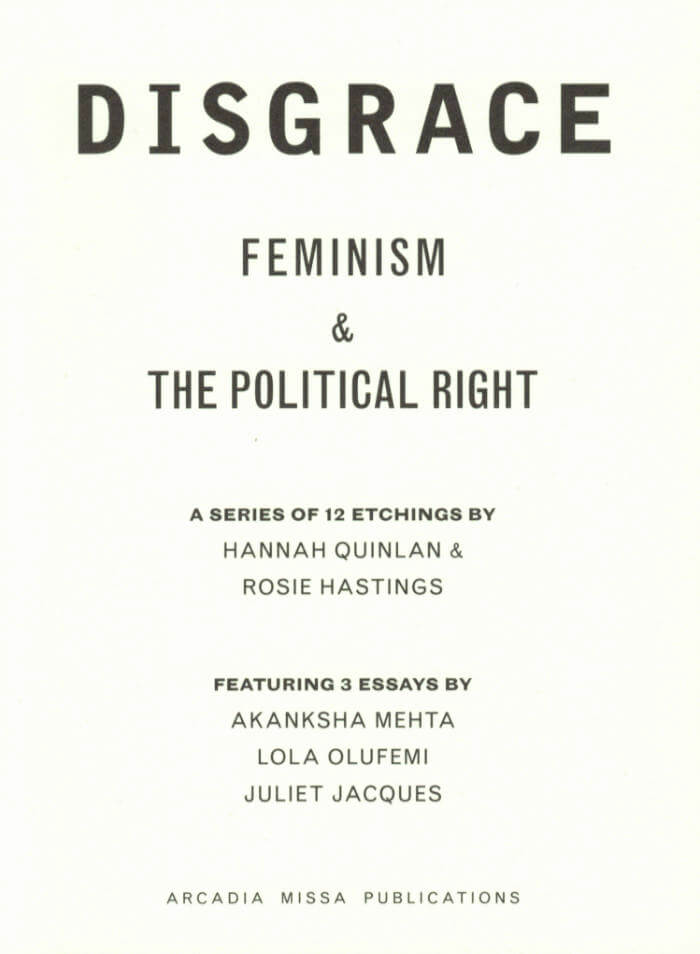
Disgrace: Feminism And The Political Right
Rosie Hastings, Hannah Quinlan
DISGRACE: Feminism and the Political Right explores the history of conservative feminism in the UK from the Edwardian period to today. Expanding on Hannah Quinlan and Rosie Hastings’ research for their eponymous exhibition, the book aims to provide contextual information for the viewer, both as a resource on the history of feminism on the political right and to provide a deeper historical and political insight into the works within the exhibition.
The book centres around a timeline created by 12 etchings, with three essays covering what the artists have identified as three significant time periods, mapping the connections between the various historical manifestations of conservative feminism that lead to the current moment. An essay by Akanksha Mehta, a lecturer in Gender, Sexuality, and Cultural Studies and the co-director of the Centre for Feminist Research at Goldsmiths, considers the nature of the women’s suffrage movement, focusing on the relationship between the suffragettes and eugenics discourse. A polemical text by Lola Olufemi, a black feminist writer and organiser with the London Feminist Library, questions the women’s liberation movement and ‘sex wars’ of the mid 20th century. In the final essay – alongside etchings exploring ‘free-market feminism’, Theresa May’s ‘Women2Win’ campaign and the proliferation of transphobic rhetoric – writer, filmmaker and journalist Juliet Jacques uses Caryl Churchill’s innovative 1982 play ‘Top Girls’ to trace the trajectory of women in power, from Thatcher into the future of feminism.
FEATURING 3 ESSAYS BY:
Akanksha Mehta
Lola Olufemi
Juliet Jacques

Twenty Terrifying Tales from our Techno Feudal Tomorrow
William Kherbek’s Twenty Tales from our Technofeudal Tomorrow are of course twenty tales from our technofeudal today. From the software company to the art gallery to the prison to the nature park, here is our scary, scary world as seen through the Kherbekian filter: colors pushed to full saturation, soundtrack ramped up to eleven, video played at 1.1x speed. Luckily, the terror of true realism is laced with wild insights, and the acerbic critique is mercifully cut with Kherbek’s signature raucous hilarity.
"Read this book for its political sagacity and wit, but also for its linguistic extravagance, its jubilant play on every word you thought you knew — down to the last punctuation mark. It’s the kind of funny that makes you smack yourself on the forehead. (But as always, as one character reminds, “keep one hand free for rose.”) We can only hope that some CEO does not pick this book up and take it as an instruction manual." – Elvia Wilk, author of Oval
"Kherbek’s ruthless, dystopian future bears an uncanny resemblance to present-day office politics. Twenty Terrifying Tales from Our Technofeudal Tomorrow is a book that, in true Swiftian style, is written “to vex the world rather than divert it.” – Susan Finlay, author of My Other Spruce and Maple Self
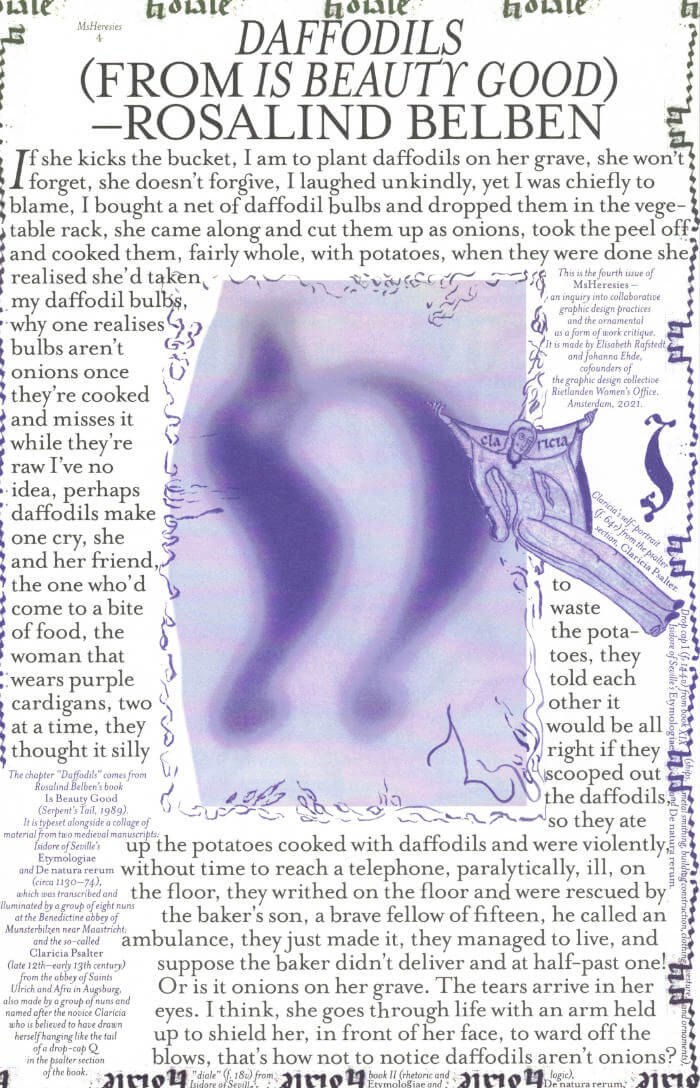
MsHeresies 4 — Daffodils
Elisabeth Rafstedt, Johanna Ehde
This fourth issue of MsHeresies republishes the chapter *Daffodils* — a warped monologue about a domestic poisoning — from Rosalind Belben’s book Is Beauty Good (1989).
It is typeset alongside a collage of material from two medieval manuscripts: Isidore of Seville’s Etymologiae and De natura rerum (circa 1130–74), which was illuminated and transcribed by a group of eight nuns at the Benedictine abbey of Munsterbilzen in Maastricht; and the so called Claricia Psalter (late 12th–early 13th century) from the abbey of saints Ulrich and Afra in Augsberg, also made by a group of nuns and named after the novice Claricia who is believed to have drawn herself hanging like the tail of a drop-cap Q in the psalter section of the book.
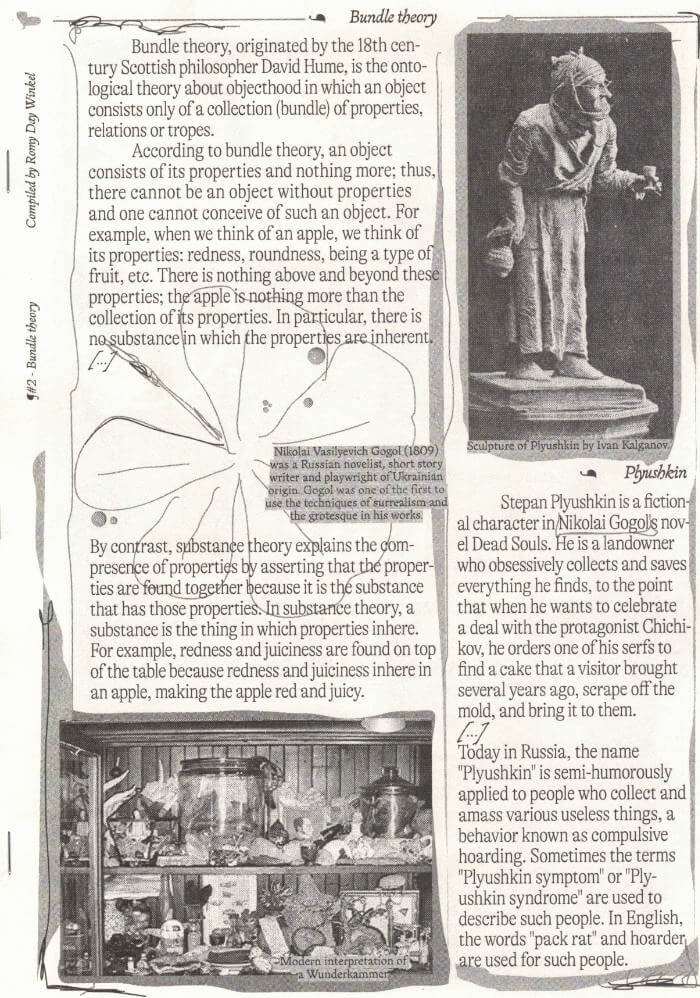
¶#2: Bundle theory
For #2 in the ¶ (Pilcrow)-series Romy Day Winkel has approached collecting, or hoarding, as an aesthetic of patience. Through her selection of Wikipedia-articles she looks at what happens when objects, magical or otherwise, are all put together. If it is impossible, and perhaps even uninteresting, to know when a collection or archive is finished, how does one start to hoard impatiently
¶#2 consists solely of texts and images found on the online collaborative platform Wikipedia. ¶#2 is assembled by Romy Day Winkel, designed by Tjobo Kho and Wouter Stroet, edited by Jan-Pieter ‘t Hart and published by OUTLINE.

Studies on Fantasmical Anatomies
Studies on Fantasmical Anatomies is an ongoing transdisciplinary artistic research, which encompasses the spectrum of experiences and practices that Anne Juren has developed as a choreographer, dancer and Feldenkrais practitioner. Her interest in anatomy and somatic practices grew out of multiple shoulder dislocations. The last dislocation happened in 2014 and, in retrospect, it functioned as a catalyst for this PhD and as one of its main methodologies. With the notion of “anatomies”, the interest sits more in operations on the body, than defining the body itself.
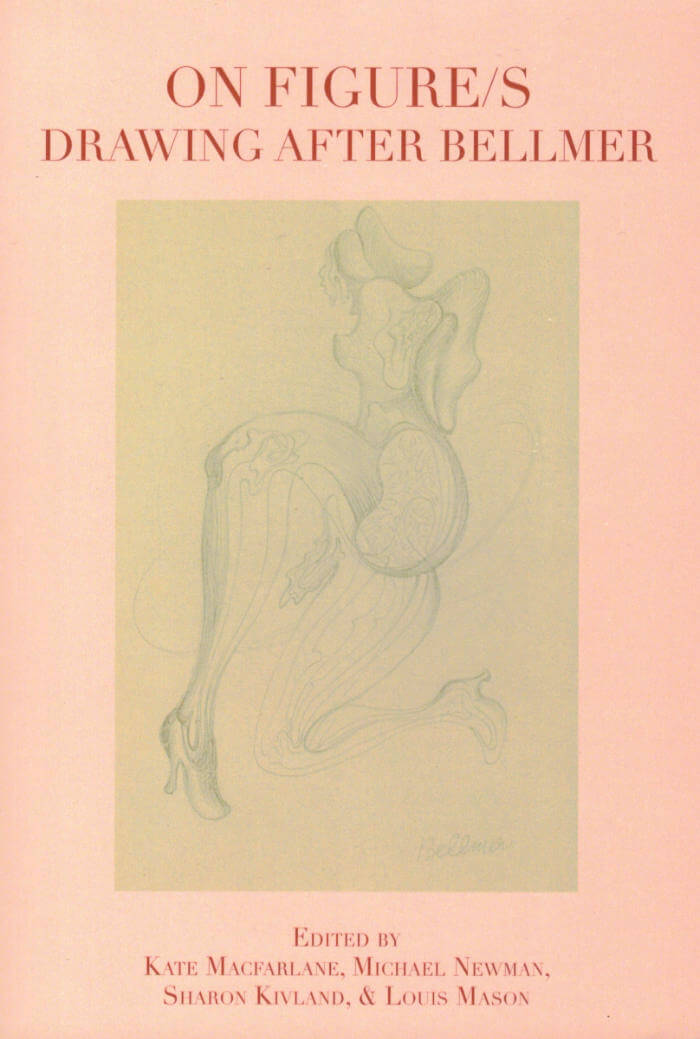
On Figure/s. Drawing After Bellmer
Louis Mason, Sharon Kivland and 2 more
Raised by a fascist father in Nazi Germany, the Surrealist artist Hans Bellmer (1902-1975) dedicated his œuvre to a perverse rewriting of the symbolic order. Famous for the two dolls he constructed in the mid-1930s, his transgressive ideas around the body as anagram were shared by his partner Unica Zürn. Both broke received codes of behaviour and the implicit rules of language, providing fertile ground for artists and other thinkers, including feminists, to similarly rewrite the body. ON FIGURE/S is published in parallel with the exhibition FIGURE/S: drawing after Bellmer (Drawing Room, London, September 2021). It gathers responses to its themes: body as letter, word and sentence; perversion and enjoyment; technical and forensic drawing in pursuit of pleasure; the other than human—becoming object, plant, animal. This book is a way to think through and with works of art and their histories, involving multiple textual forms, collage, and drawing, which take the radical and transgressive energy of Bellmer and Zürn in unexpected directions.
Contributors: Paul Buck, Lola Bunting , Alice Butler, Paul Chan, Iris Colomb, Vincent Dachy, Zoë Dowlen, Rachel Genn, Aurelia Guo, Mathew Hale, Tom Hastings, Rebecca Jagoe, Sharon Kivland, Sarah Lederman, Kate Macfarlane, Kumi Machida, Louis Mason, Reba Maybury, Jade Montserrat, John Murphy, Michael Newman, Bernard Noël, Tamarin Norwood , Francesco Urbano Ragazzi, Aura Satz, Sophie Seita, Anne Lesley Selcer, Isabel Seligman, Sarah Wilson
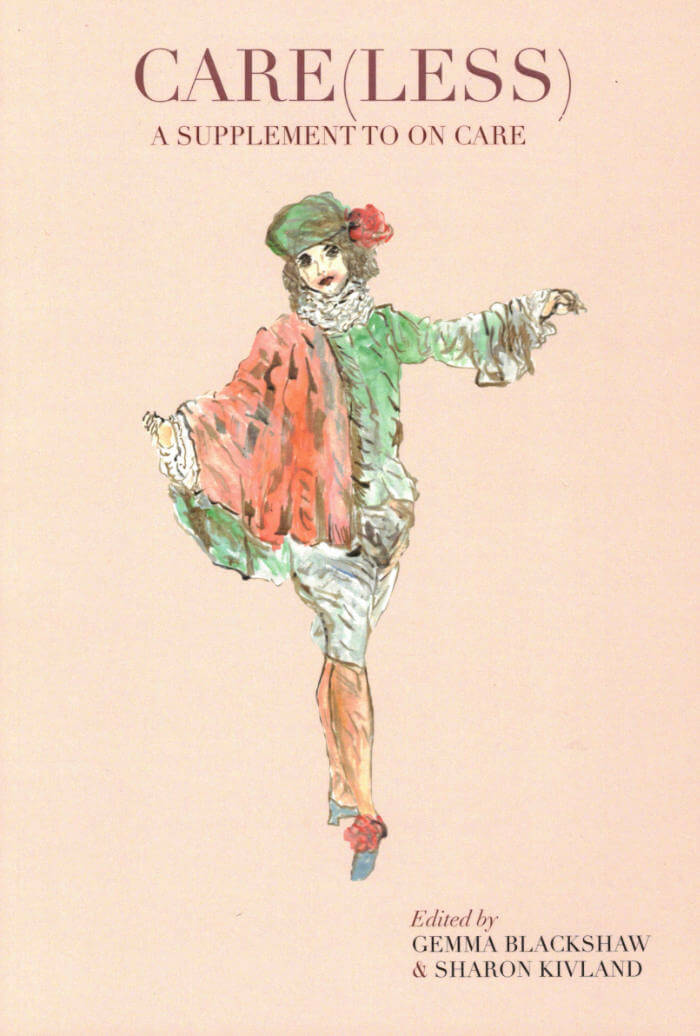
Care(less). A Supplement To On Care
Gemma Blackshaw, Sharon Kivland
The harshest of lights shines on the question of care in the age of neo-liberalism and globalisation: who gets it, who needs it, who does it, who controls it. The Care research group at the Royal College of Art works in this light to ask how to care for human bodies in the inequitable societies COVID-19 has re-inscribed, through the activation of creative research practices as means of caring. Reflecting on the care phenomenon of 2020/21, the group invited the editors of ON CARE (MA BIBLIOTHÈQUE, 2020) to return to their book conceived before the pandemic. As part of that discussion, the group was asked to consider what is lack of care and what lacks in care. Their responses form this supplement to ON CARE, working with what was at hand, with what was missed, forgotten, neglected, ignored: CARE(LESS).
Contributors: Sohaila Baluch, Gemma Blackshaw, Anja Borowicz, Caroline Douglas, Shannon Forrester, Marita Fraser, Nora Heidorn, Ameera Kawash, Sofie Layton, Joshua Leon, Xiaoyi Nie, Amy Peace Buzzard, Ilona Sagar, Dafne Salis, Adam Walker, Sharon Young, Shuye Zhang

Cops Get Dead. Alexandre Benalla’s day out
COPS GET DEAD. Alexandre Benalla’s day out was written in several hours and was first performed at NO MONEY in London, May 2019, at the invitation of the NO MONEY organising group. It has also been performed in North Carolina, Washington, and New York in June, July, and August 2019. An earlier version of Cops Get Dead was edited and published by David Buuck in TRIPWIRE 16, July 2020, Oakland.
An early version, in which the sex workers from Livre Livret Liver (MA BIBLIOTHÈQUE 2019) end up in prison with Pierre Goldman (d. 1977) discussing Redoine Faïd’s most recent jailbreak (July 2018), called Livre Livret Liver Appendix: Two Hold ups & Some Suspended Sentences was performed at Mimosa House in London at the invitation of sabrina soyer and Theodora Domenech, in March 2019. It is included here.

Imagine a Death
A depiction of the cycles of abuse and trauma in a prolonged end-time, Imagine a Death examines the ways in which our pasts envelop us, the ways in which we justify horrible things in the name of survival, all of the horrible and beautiful things we are capable of when we are hurt and broken, and the animal (and plant) companions that ground us.

Arcana X: Musicians on Music
Initiated in 1997 and now in its tenth and final installment, John Zorn's acclaimed Arcana series is a major source of new music theory and practice in the 21st century. Illuminating directly via the personal vision and experience of the practitioners themselves, who experience music not from a cool, safe distance, but from the white-hot center of the creative crucible itself, Arcana elucidates through essays, manifestos, scores, interviews, notebooks and critical papers.
Over 25 years the ten volumes of Arcana have presented the writings of over 300 of the most extraordinary musical thinkers of our time, who address composing, performing, improvising, touring, collaborating, living and thinking about music from diverse, refreshing and often surprising perspectives. Technical, philosophical, political, artistic and mystical in nature, these writings provide direct connections to the creative processes and hidden stratagems of musicians from the worlds of classical, rock, jazz, film soundtrack, improvised music and more.
Contributors include: Susan Alcorn, Oren Ambarchi, Ran Blake, Peter Blegvad, Tyondai Braxton, Patricia Brennan, John Butcher, Ben Coniguliaro, Amir Elsaffar, Kenny Grohowski, Tom Guralnick, Mark Helias, David Hertzberg, Stefan Jackiw, Dan Kaufman, Derek Keller, Richard Kessler, Pauline Kim, Ulrich Krieger, Hannah Lash, Dan Lippel, Annea Lockwood, Dave Lombardo, Charlie Looker, Thomas Morgan, Stephen O'Malley, Laura Ortman, Alex Paxton, Alexandria Smith, Conrad Tao, Pat Thomas, Henry Threadgill, Anna Webber, Fay Victor, Christian Wolff and Miguel Zenon.

Verlag der Buchhandlung Walther König
Get Rid Of Meaning
American author Kathy Acker was one of the most influential writers of the 20th century. Working through an experimental and avant-garde tradition, she wrote numerous novels, essays, poems, and novellas from the early 1970s to the late 1990s. As a postmodernist, plagiarist, and post-punk feminist, she continues to inspire generations of writers, philosophers, and artists. Get Rid of Meaning is the first comprehensive publication on Acker’s work from an artistic and literary perspective. It includes previously unpublished material from Acker’s personal archive and other collections. The publication is the compilation of a multipart research project including an exhibition and a symposium at Badischer Kunstverein in Karlsruhe.
With contributions from: Kathy Acker, Eleanor Antin, Dodie Bellamy, Hanjo Berressem, Ruth Buchanan, William S. Burroughs, Anja Casser, Georgina Colby, Leslie Dick, Claire Finch, Johnny Golding, Lynn Hershman Leeson, Anja Kirschner, Chris Kraus, Sylvère Lotringer, Douglas A. Martin, Jason McBride, Karolin Meunier & Kerstin Stakemeier, Avital Ronell, Carolee Schneemann, Daniel Schulz, Matias Viegener & McKenzie Wark.

Our Grateful Dead: Stories of Those Left Behind
Vinciane Despret’s unique storytelling, woven with ethnography and family history, assembles accounts of those living their daily lives with their dead. She explores how the dead play an active, tangible role through those who are living, who might assume their place in a family or in society; continue their labor or art; or thrive from a shared inheritance or an organ donation.
Vinciane Despret is associate professor of philosophy at the University of Liège and the Free University of Brussels. The original French edition of Our Grateful Dead ( Au bonheur des morts) won the prestigious Prix des Rencontres Philosophiques de Monaco. Her books include What Would Animals Say If We Asked the Right Questions? and The Dance of the Arabian Babbler: Birth of an Ethological Theory, both from Minnesota.
Stephen Muecke is professor of creative writing at Flinders University, South Australia. His many translations include works by Gilles Deleuze, Roland Barthes, and Luce Irigaray.
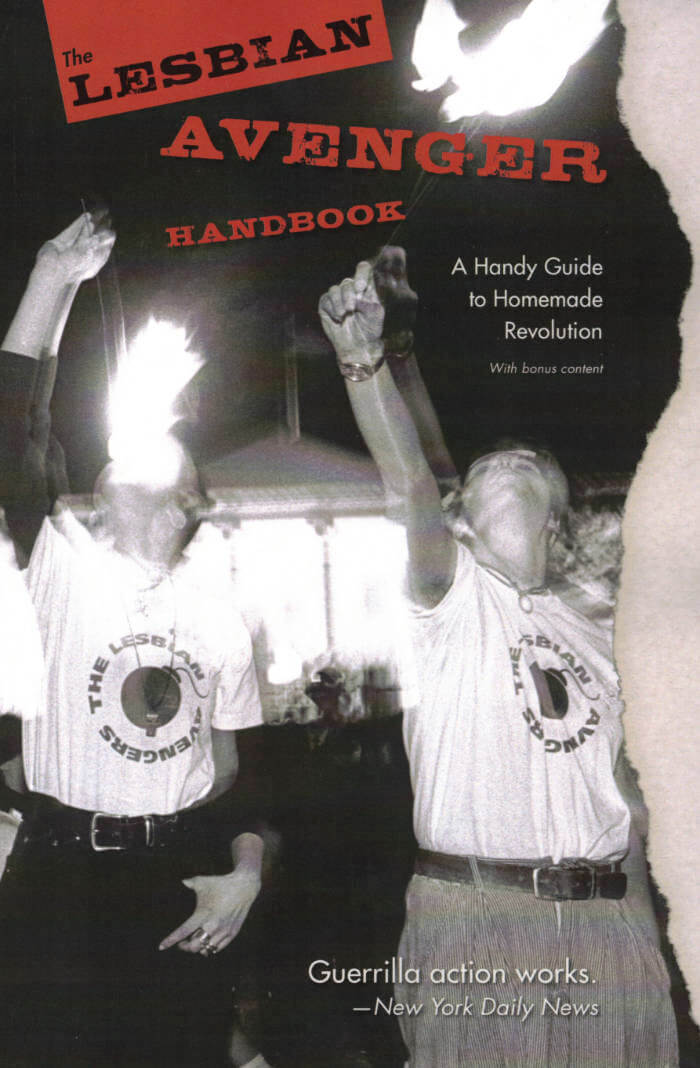
The Lesbian Avenger Handbook
Launched in New York City, in 1992, the Lesbian Avengers rejected the picket line and ordinary demo for media-savvy, nonviolent direct action.
They were superheroes arriving "to make the world safe for baby dykes everywhere;" warriors with capes and shields doing a line dance; dykes "Lusting for Power," pushing a giant bed float down Sixth Avenue in New York (with lesbians on it); nationally-ambitious Avengers eating fire in front of a hostile White House; lovers reuniting a statue of Alice B. Toklas with Gertrude Stein, then waltzing in the snow in Bryant Park. And homos who shamelessly chanted, "Ten percent is not enough, recruit, recruit, recruit."
Originally published in 1993, Homocom edition 2021